We continue to publish the texts of Spas TV program My Path to God, where Priest George Maximov interviews people who converted to Orthodoxy. The guest of today’s program is Anton Gotman, who had been practicing Buddhism for a long time. In this interview, he will tell us what he was looking for but couldn’t find in Buddhism and how Christ touched his heart. We will also discuss the personal and impersonal aspects of faith as well as the artificiality of “Russian Buddhism”.
Priest George Maximov: Hello, you are watching My Path To God. The guest of today’s program is Anton Gotman, a man who has a firsthand knowledge of the Buddhist tradition. Anton Sergeyevich, here’s my first question: What did you think of God before you became a Buddhist?
Anton Gotman: I didn’t have a true faith in God. I was baptized when I was eight. Occasionally, I would go to church with my parents. Basically, they were believers, but I didn’t see any purpose behind their faith. Every now and then I’d come across some books but that was it… I didn’t have an in-depth understanding of the Christian tradition. Once in a while I’d go to church and meet the priest. I really liked him as a person, but I didn’t appreciate Christianity. Later, I got interested in rock music and martial arts and started to distance myself from religion, so that at some point I even began to think that Christianity was an utter nonsense. After a while, when I got into college, I got interested in the Orient. I tried to study the Roerichs’1 teachings, but they didn’t impress me at all and neither did other theosophical ideas. Then a difficult period of my life followed, and I was very depressed. By chance, I came across a Soviet book on religious studies that described Buddhism, and it became an eye opener for me. I learned about “the four noble truths”2 and became interested, so I started studying Buddhism with some people who practiced it. After a while, I decided that I wanted to be taught by a teacher of the true Buddhist tradition.
Father George: What did you find attractive in Buddhism?
Anton Gotman: I did not believe in God, and for people who do not believe in God but wish to live righteous lives or have something spiritual in their lives, Buddhism can show a certain way. In fact, Buddha taught many things that were right. For example, just like Christianity, Buddhism teaches that we must not kill. On the one hand, it is the same, but there is a significant difference. We can’t say that Buddhists follow God’s commandment, “Thou shall not kill”, because it is not God’s commandment for them. You can say that people follow God’s commandments only when they believe in God.
Father George: Yes, motivation is important.
I saw Buddhism as an opportunity for developing certain qualities. My interest in martial arts was an influence too.
Anton Gotman: Even though there is no faith in God in Buddhism, it offers a certain spiritual way and a system of meditation that at some point attracts people and allows them to relax and experience certain positive feelings. In Tibetan Buddhism, where I was a member of the community of Namkhai Norbu Rinpoche, everything was much more interesting, with more mystic experiences and opportunities to do yoga, etc… I’ll try not to overuse the Buddhist terminology and explain everything in understandable terms. I saw vast opportunities for self-realization and developing certain qualities—this was what made Buddhism attractive to me. My interest in the Orient and martial arts in particular was an influence too. I was simply curious at first, but after a while I became a very dedicated Buddhist.
Father George: You turned to Tibetan Buddhism because you were searching for a traditional Buddhism, so that it would be more than just reading books?
Anton Gotman: Yes, I was searching for tradition.
Father George: How did that happen? Did you take refuge3?
Anton Gotman: Initially, I was given a book by Namkhai Norbu Rinpoche. I read it and liked it very much. Then I found a community in our city that practiced this version of Buddhism. There were just a few people there at the time, now they have more. After that, I went to a retreat and that was where I took refuge.
Father George: What is a retreat?
Anton Gotman: In a way, it is a workshop where an instructor explains teachings, initiates people, transfers knowledge, etc. Naturally, because many people attend such retreats, there are instructors that have more advanced sessions with small groups of people.
Father George: You probably made some acquaintances and friends there?
Anton Gotman: Of course. I made acquaintances and met new friends. Ultimately, my wife got interested in Buddhism too. In fact, at the time when I converted to Christianity, all my friends were Buddhists.
Father George: As far as I know, this Buddhist period of your life lasted for about ten years. It is a long time. Moreover, you had a traditional Buddhist teacher and all your friends and acquaintances had similar interests. What motivated you to turn to Christ?
What motivated me to turn to Christ? God led me. He simply made me do it. This was how it happened.
Anton Gotman: To make a long story short, God led me. He simply made me do it. This was how it happened. In 2008, the rock groups “DDT” and the “Brothers Karamazov” participated in a concert dedicated to the 1020th anniversary of Christianization of Russia. As part of the show, Deacon Andrei Kurayev delivered sermons. Of course, I didn’t convert right away after listening to his sermon during the show, but I thought, “This is the Deacon Andrei Kurayev who wrote some bad things about Buddhism, as I was told. I should read his books.” So I did. I should say that I was not impressed by what he wrote about Buddhism.
Father George: Why?
Reading about Christianity, I understood that it gave more food for thought and offered a more profound understanding of many issues.
Anton Gotman: Well, when Buddhists talk about Christianity, it often seems simply ridiculous to Christians, because outsiders do not understand many things as profoundly as Christians who study Christianity. Christians talking about Buddhism are perceived by Buddhists in the same way, simply because Christians cannot know Buddhism as well as people who studied and practiced it for a long time. Father Andrei relied on the works of Orientalist scholars and admitted that he didn’t study Buddhism in-depth. Actually, his book Satanism for Intellectuals focuses on the teachings of theosophists and the Roerichs, and only one section of it is dedicated to Buddhism. I read this section first. It didn’t impress me, but I got intrigued by what he wrote about Christianity. I used to think that Christianity was a good, albeit not very clever tradition, but then I understood that contrary to what I believed earlier this was a tradition that gave more food for thought and offered a more profound understanding of many issues. I started reading the book from the beginning but stopped because it dealt with theosophy and the Roerichs and this didn’t interest me. So, I decided to read Father Andrei’s books about Christianity. I downloaded all available materials from Deacon Andrei Kurayev’s site as well as some books by other Orthodox authors and started reading. For about three weeks, I dedicated my all my spare time to reading these books. I would finish reading one book in a day or two. After that, I started having a “withdrawal”, and sometimes my head even ached.
Father George: How would you explain it?
Anton Gotman: It wasn’t anything psychological, I simply was under great stress because I began to realize that I was standing in front of certain doors, standing before Christ. I knew that I could turn away and continue my usual way, but I also knew that if I turn away from Christ now, I would lose something that I would never find anywhere else. I was having really serious withdrawal symptoms, because as you understand, I spent ten years in Buddhism, my wife and friends were Buddhists and practically my entire life was devoted to it. Now suddenly, I had to choose between Christ and going my old way.
Father George: What were your impressions when reading Christian literature?
I found that according to Christian hermits many states achieved in Buddhism were a deception. This got me thinking.
Anton Gotman: Actually, reading these books, I was amazed by the profundity of Christianity. I was amazed by a holiness of Christian people that I never saw in Buddhism. I do not mean to be disrespectful to Buddhists, but I started comparing and realized that I didn’t see anything like that around me in Buddhism. Here’s another interesting thing: Many Buddhist practices and states (for example, the observation of inner light, etc.) are described by Christian hermits as mistakes, fallacies and delusion. I thought, “These are the people who achieved these states, saw and learned the same things, but they turned away from them, saying that this path was wrong, and went a different way.” This got me thinking also.
I didn’t have any visions or anything like that. I simply understood that Christ was with me. And that He was always there for me.
So, I got back to Satanism for Intellectuals, thinking that I had to finish the book since I had already started reading it. At the end of the book, Father Andrei placed a trap—in the good sense of the word—and I’m very grateful to him for it. He wrote basically, “God gives you freedom and you can choose an occult or theosophical way. Alternatively, you can turn to Christ and go the Christian way. But before you make your final choice, right now after you finish reading this book, appeal to Christ in prayer.” And there was the text of the Jesus Prayer: “Lord Jesus Christ, Son of God, have mercy on me, a sinner.” When I said this prayer, I understood that I was Christian. That was it. I didn’t have any visions or anything like that. I simply understood that Christ was here, that He was alive and beside me. He has always been there for me. Now He revealed himself to me and I was standing beside Him. It can’t be described in words, but the realization that Christianity can immediately take people beyond the cycle of samsara (which they have been inventing for themselves for a long time) came almost right away… I don’t know how to describe it. Before that I saw a clear distinction: this is one feeling and that is another feeling, but at that moment there was nothing—no bliss, no visions, etc. I simply felt that I woke up from a long lethargic sleep and began to live.
On that very day, my friends were going to meet at my place for some Buddhist practices. However, I understood that I had absolutely no desire to do that. Since I couldn’t just kick my friends out, I said, “I have some business to attend to, you proceed without me.” Next time, I skipped the practice too. Later, when I told everything to my wife and she told the others, they decided to practice somewhere else. We remained friends, there were no problems. I’m grateful to them all, but…
Father George: They were probably surprised, weren’t they?
Anton Gotman: They were. They were asking me why. I explained as best as I could.
Father George: Did they understand?
Anton Gotman: I don’t know. I hope to God that all my friends would come to Christ. Naturally, people still have their free will. In addition, everybody has their own beliefs and views on life. It is difficult to change them all.
Father George: What do you think is the main difference between Christianity and Buddhism?
Anton Gotman: Buddhism and Christianity offer two absolutely different outlooks. In the beginning of this interview, we said that Buddhism is a good way for atheists. To be more specific, it offers an attractive path for those who don’t believe in God the Creator. It is not for total atheists, for in Buddhism people believe in many various deities. However, these deities in Buddhism are perceived as entities of samsara that need to be liberated. In addition to deities, there are enlightened entities and in Tibetan Buddhism; as they say, there are thousands of thousands of buddhas, that is a countless number of buddhas and bodhisattvas for Buddhists to appeal to… But there is purposefully no believing in God the Creator.
It is axiomatic for Buddhists that the Absolute is impersonal. However, what is the most interesting thing for us? What are we looking for? It isn’t impersonality, is it?
Another axiom for Buddhists is that the Absolute is impersonal. I ask, “Why? Why do you think that the Absolute is impersonal?” They say, “Because personality is a limiting quality.” I say, “Let’s have a look. If I have a personality and the Absolute doesn’t, it means that it can’t be called the Absolute at all because it doesn’t include me or my personality. This makes me more perfect than the Absolute.” It turns out that the Absolute is similar to a rock or electricity. Or any impersonal thing for that matter! For example, this table and tea in these teacups are impersonal. However, what is the most interesting thing for us in life? What are we looking for? We’re having this discussion now because personality is interesting for us. We are not communicating with this tea or this table. Take this program – people watch it because they are interested in communication between personalities. The same goes for movies: What will happen if you shoot a ten-part series without any personalities, just two birch trees and a rock? Well, a rain may fall, and that’s it (laughs).
Father George: This won’t a blockbuster for sure (laughs).
We are looking for ideal relationships with an ideal person. God is the ideal Person.
Anton Gotman: I don’t think anybody would want to watch that. Let’s take cartoons for children. They draw a little train engine. It is an impersonal subject, but they draw eyes and show that he can smile or be sad… That is, they give the engine some personal qualities, making it closer to people so that it is interesting to watch. It’s because personality is interesting for us, we are not interested in anything else. In general, in this world we look for personalities only. We are looking for ideal relationships with personalities. As children, we develop relationships with parents and friends. When we grow up we want to find our true love. One would say, “I want to find the love of my life.” That is, to find a more profound relationship with another person. All people are looking for better relationships. When people get married, if they are a normal husband and wife, they make their love grow stronger and stronger. Why? Because everybody is looking for ideal relationship with an ideal person. And there is God, Who is the ideal person and with Whom we establish the absolute relationship.
By the way, Christ reveals even more. All theistic religions say that God is one and that He is a personality, but Christ reveals the truth that God is the Trinity, Who on the one hand has the same personal qualities we discussed earlier, and on the other hand the Trinity is open to love and to the world. So, in this respect Christianity is a more profound revelation than the teachings of all other theistic religions. While Buddhism postulates that the Absolute is impersonal, it still acknowledges that we have sufferings, and as they are meaningless torments we need to get rid of them and help others to do so too. This is the motivation offered by Buddhism, the seed that is the origin of everything.
However, if we assume that we have a Divine Personality, a loving Father Who created the world and all people because of His love for us, then when we start, or rather resume, our relationship with God, what does suffering become for us? We believe that our suffering and all our troubles are our punishment. This punishment provides guidelines telling us where we should be going. That is, a kind and loving Father uses this event to tell you: instead of going this way, go that way. He shows us something good. As such, suffering becomes meaningful.
Father George: Basically, if we believe in a Divine Personality that we can relate to, then not only suffering, but everything in our lives becomes meaningful. All our lives become a dialogue with God. We do not have any baggage or any “unnecessary” events in our lives. Every event in our lives is meaningful. God wants to tell us something through these events, so the sufferings become meaningful. God uses them to tell us something, help us and make us pure. This is very different from what people see when they turn to Buddhism, which just like other Indian religions was born out of the horror of meaningless suffering that people needed to escape at any cost. Even if the price was as high as…
Anton Gotman: …losing your personality. Yes! Let’s take for example the Book of Job. Job lost everything, his possessions, children and health. He experienced immense suffering, yet he said, “the LORD gave, and the LORD hath taken away; blessed be the name of the LORD.” (Job, 1:21). This is the man who understands the Truth on some higher level than Buddha offers. Job understands that God took it all away for his own good, and this is exactly why it happened. He says, I have heard of thee by the hearing of the ear: but now mine eye seeth thee. (Job 42:5). In other words, he reached a new level of knowledge of God.
How do you know what is in fact better for a certain person? Should this person suffer or not?
When we talk about suffering in the world, people often ask, “Why did your good God let this happen?” But how do you know what is in fact better for a certain person? Should this person suffer or not? When is it better for him or her to die—now or in five years? Maybe in these five years this person will become a monster or succumb to alcoholism. We don’t know that, but God does. If we just look around, we will see that a single cell of a human body is much more complex than anything that people can create. The human body is a great array of cells and every one of them acts differently. What about the Earth? The Universe? Everything is set up to maintain life and help people live in this world. In addition to the unimaginable complexity, we also see the great beauty of the Universe, even when we simply look up to see the starry sky. God’s mind embraces the things that we cannot even begin to fathom. That is why all complaints to God, like “Why did you do this instead of what we wanted?” are absurd and preposterous.
Father George: What difficulties did you face? What was the most difficult for you when you went from inner understanding of the truth of Christianity to leading the Christian life? Was there anything you had to overcome in yourself?
Anton Gotman: I don’t know if I should discuss my inner emotions. To make a long story short, there were problems. So, I would advise people who are making the choice now whether to go there or here—you’d better not go there. There are things that are better left alone. People shouldn’t know or try them. Ever.
Father George: Do you mean Buddhism?
When Buddhism was established in some region, it would even incorporate some of the demons that locals believed in. And Buddhists appeal to them and worship them.
Anton Gotman: I mean many Buddhist practices. How can we say anything about Buddhism in general?! Buddha offered a certain teaching 500 years before Christ. Maybe for an atheist, who doesn’t believe in anything and is devoid of any morals, adopting Buddhism would be a step forward. At least such a person would start to follow some moral guidelines and understand that life doesn’t end with death and that he or she would be held accountable in the afterlife. Buddhism teaches that after death people will answer for everything they did in their lives. This was the step that I made. Naturally, it would have been better for me to come to Christ directly, without making this unnecessary step. The danger of unnecessary steps is that a person may get stuck on the way and not go any further. This is the problem. God is a Personality and relationship with God is the main thing in life. Obviously, Buddhism cannot give it to us. Buddhism can offer some moral guidelines, but there are many side effects. Buddha’s original teaching is different from all other teachings that Buddhism adopted in various regions in the course of history. It adopted some deities, guardians, even demons… When Buddhism was established in a certain region, it would incorporate demons, not from our Christian point of view, but from the point of view of locals, and these demons would be considered enlightened entities, guardians of the doctrine, etc. In some practices, Buddhists appeal to them and worship them.
Father George: Yes, Jamsaran4 and others… all those pictures with entities covered in blood, holding weapons and “decorated” with human skulls…
Anton Gotman: Buddhists will say that it is in fact an enlightened entity that came to demons to bring them teachings and cure them from their demonic state. However, even this argument begs a question, “If it came to the demons, let it stay in that form for the demons; but why do we need to talk to it in its demonic form?” People could talk to enlightened entities in human form, but no, they prefer to talk to demons. There is a price to pay for that. Practices that involve appealing to demons create problems that may have serious consequences.
Father George: I saw you talking online with people who call themselves Russian Buddhists. What do you think of these discussions and how does these people’s vision compare to the Buddhism you knew?
Russian Buddhists are still people of Russian culture.
Anton Gotman: Well, we grew up in a certain environment. This culture was formed on the basis of Orthodoxy some time ago and then it was subjected to atheism for a long time. Most of the Buddhists of my age or older are people who were born in the Soviet Union. In those days the Orient became fashionable and it was very popular for some time. Against this background, many people became interested in Buddhism. And in the end a lot of people developed their own understanding about it. Of course, there are also traditional schools, and there are people who want to understand this religion properly, study Tibetan language and Sanskrit and delve into various texts, but still they remain the people of our culture. Even the Dalai Lama mentioned it in one of his interviews. I read it a long time ago, when I was still Buddhist and wondered, “What is he talking about?” He meant that it was better for a person who grew up in a Christian environment to remain Christian rather than convert to Buddhism, because such a person would cease to be Christian but wouldn’t understand Buddhism properly. This is happening quite often—people begin to adapt Buddhism to match some of their personal preferences.
Father George: People who live here and wish to learn about Christian culture can find a living tradition, while people living in Central Russia, Ukraine or Belorussia who wish to learn about the Buddhist culture would have a hard time finding a living tradition in our country. They could, of course, go to Kalmykia, Buryatia or Tyva, but these regions were also affected by the Soviet period and it is doubtful whether uninterrupted Buddhist tradition has been fully preserved there. So what is happening in reality? Our people who are interested in Buddhism usually find knowledge in the books adapted for people of Christian culture, and then they adapt them once again to match their personal preferences. As a result, every “Russian Buddhist” has his or her own Buddhism, while still believing that their Buddhism is the most accurate.
When they experience the living tradition, “Russian Buddhists” say, “This is absolutely not what we had in mind!”
Anton Gotman: There is another aspect: Some of our Buddhists first study Buddhism in Russia and then go to experience the living tradition, say, in the north of India where they have a lot of Tibetan monasteries. So, when they experience the living tradition, “Russian Buddhists” say, “This is absolutely not what we had in mind! How is it different from the things we didn’t like in Orthodoxy, like ritualism? These traditional Buddhists have the same thing.” Our people who try to understand Buddhism often imagine the Orient in a certain romantic aura, but quite often this aura disappears after a trip to India or other traditionally Buddhist countries.
The problem of any religion traditionally practiced in a certain region is that there are a lot of people who are only formal followers. They are not interested in the doctrine and care only about solving some of their earthly problems. In Russia, such people would go to an Orthodox church to bless their new cars, baptize their children so they don’t get sick, and that’s it. Buddhists in Russia are the people who made a conscientious choice, the people who are searching, studying and practicing. If you compare nominally Orthodox people with conscientious Buddhists, the latter may seem to be more attractive. But if you go to a Buddhist country or a region, you’ll see that most of the believers there also limit their religious lives to rituals that are used to drive evil spirits from their homes or cars, help their children to stay healthy, and that’s all. They are simply not interested in any “noble truths” of Buddhism. On the contrary, Orthodox communities in such non-Orthodox environments often consist of deeply religious Christians, the people who made a conscientious choice. Many of our people who are into Buddhism do not understand that, but when they get to the actual environment where traditional Buddhism is practiced by most people, they are surprized and disappointed.
Father George: We should note that our neophytes often produce quite a peculiar impression on people of traditionally Buddhist countries. Several years ago, I lived in Thailand for some time. There was a Russian language TV channel owned by a Russian businessman who considered himself Buddhist. There was a program on this channel where he very seriously preached Buddhism to the Russian viewers. Interestingly, Thai people who knew Russian watched this program as a comedy show: the things that this foreigner was telling them about the religion that they were practicing since childhood seemed funny to them. In fact, the words of Dalai Lama you mentioned earlier relate to the same problem.
Anton Sergeyevich, thank you very much for your story. I hope to God that everyone would find their path to God.








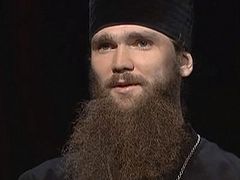
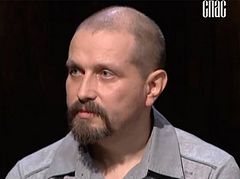
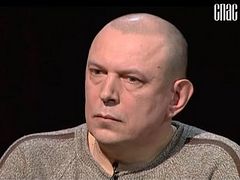
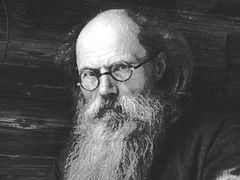
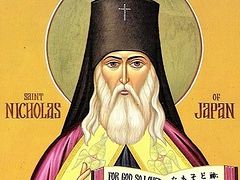
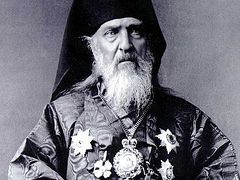
Baptized as a Roman catholic I was received in orthodoxy when I was 48.
My conclusion:on strictly religious matters its'all demoniac,no doubt about that.
And I felt better,so much better at our Divine Liturgy in the orthodox cathedral in Ulan Bator.